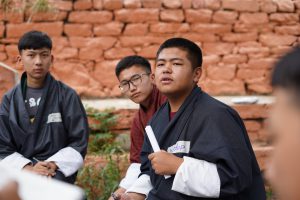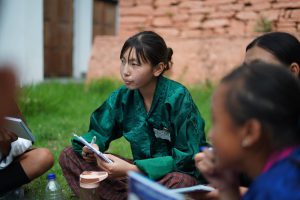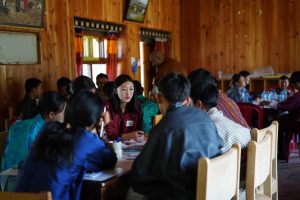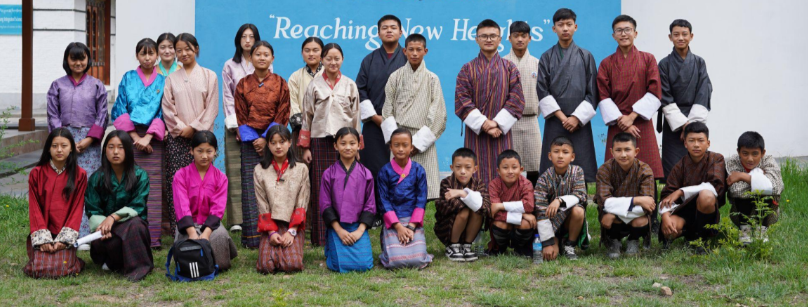
27 young people from various schools in Paro, Thimphu, and Haa enthusiastically participated in the Youth Initiative Summer Camp held at Paro College of Education. The camp commenced with an enlightening session where the participants familiarised themselves with their rights and responsibilities, emphasising the significance of the Child's Rights Convention. Surprisingly, many participants confessed their lack of awareness regarding their rights and engaged in discussions about the crucial role of various stakeholders in upholding and safeguarding children's rights.

A 12-year-old girl asked “How can we exercise our rights?” The pertinent question was also shared by most of the children during the camp. This highlighted the need to sensitise children on this topic and how they can hold duty bearers accountable to uphold their rights.Using interactive exercises such as Cobweb, Growing My Fruit Tree and Pillar of Development proved useful in enabling them to map out key issues in the cluster areas of survival, development, participation, and protection. This process empowered the children to be critical of how they think about these different factors and rights. Among the many topics that the children discussed in groups some key issues were regarding access to safe drinking water, sexual violence, substance abuse, education reformation and its impact on them, increasing consumption of junk food, and exposure to unhealthy content online.

On the last day of the Youth Initiative Summer Camp, the diverse group of children brainstormed on key solutions for social issues such as protection from drug abuse, providing inclusive learning opportunities without discriminating against children regardless of their academic merit or family background, promoting discussion about children’s rights and their active involvement in addressing social issues that affect them. The strength of diversity was evident as children from different schools collaborated to identify effective practices from their own communities that could be applied to improve their situation in different areas.
Throughout the four-day camp, the children actively interacted with peers from 14 different schools across the three Dzongkhags. This valuable exchange allowed them to gain insights into the diverse situations faced by schoolchildren in Bhutan, and to share their perspectives on various issues that concern them and their fellow peers, thereby fostering a deeper understanding among the participants of children's status in the country.

 27 young people from various schools in Paro, Thimphu, and Haa enthusiastically participated in the Youth Initiative Summer Camp held at Paro College of Education. The camp commenced with an enlightening session where the participants familiarised themselves with their rights and responsibilities, emphasising the significance of the Child's Rights Convention. Surprisingly, many participants confessed their lack of awareness regarding their rights and engaged in discussions about the crucial role of various stakeholders in upholding and safeguarding children's rights.
27 young people from various schools in Paro, Thimphu, and Haa enthusiastically participated in the Youth Initiative Summer Camp held at Paro College of Education. The camp commenced with an enlightening session where the participants familiarised themselves with their rights and responsibilities, emphasising the significance of the Child's Rights Convention. Surprisingly, many participants confessed their lack of awareness regarding their rights and engaged in discussions about the crucial role of various stakeholders in upholding and safeguarding children's rights.  A 12-year-old girl asked “How can we exercise our rights?” The pertinent question was also shared by most of the children during the camp. This highlighted the need to sensitise children on this topic and how they can hold duty bearers accountable to uphold their rights.Using interactive exercises such as Cobweb, Growing My Fruit Tree and Pillar of Development proved useful in enabling them to map out key issues in the cluster areas of survival, development, participation, and protection. This process empowered the children to be critical of how they think about these different factors and rights. Among the many topics that the children discussed in groups some key issues were regarding access to safe drinking water, sexual violence, substance abuse, education reformation and its impact on them, increasing consumption of junk food, and exposure to unhealthy content online.
A 12-year-old girl asked “How can we exercise our rights?” The pertinent question was also shared by most of the children during the camp. This highlighted the need to sensitise children on this topic and how they can hold duty bearers accountable to uphold their rights.Using interactive exercises such as Cobweb, Growing My Fruit Tree and Pillar of Development proved useful in enabling them to map out key issues in the cluster areas of survival, development, participation, and protection. This process empowered the children to be critical of how they think about these different factors and rights. Among the many topics that the children discussed in groups some key issues were regarding access to safe drinking water, sexual violence, substance abuse, education reformation and its impact on them, increasing consumption of junk food, and exposure to unhealthy content online.  On the last day of the Youth Initiative Summer Camp, the diverse group of children brainstormed on key solutions for social issues such as protection from drug abuse, providing inclusive learning opportunities without discriminating against children regardless of their academic merit or family background, promoting discussion about children’s rights and their active involvement in addressing social issues that affect them. The strength of diversity was evident as children from different schools collaborated to identify effective practices from their own communities that could be applied to improve their situation in different areas.
Throughout the four-day camp, the children actively interacted with peers from 14 different schools across the three Dzongkhags. This valuable exchange allowed them to gain insights into the diverse situations faced by schoolchildren in Bhutan, and to share their perspectives on various issues that concern them and their fellow peers, thereby fostering a deeper understanding among the participants of children's status in the country.
On the last day of the Youth Initiative Summer Camp, the diverse group of children brainstormed on key solutions for social issues such as protection from drug abuse, providing inclusive learning opportunities without discriminating against children regardless of their academic merit or family background, promoting discussion about children’s rights and their active involvement in addressing social issues that affect them. The strength of diversity was evident as children from different schools collaborated to identify effective practices from their own communities that could be applied to improve their situation in different areas.
Throughout the four-day camp, the children actively interacted with peers from 14 different schools across the three Dzongkhags. This valuable exchange allowed them to gain insights into the diverse situations faced by schoolchildren in Bhutan, and to share their perspectives on various issues that concern them and their fellow peers, thereby fostering a deeper understanding among the participants of children's status in the country.